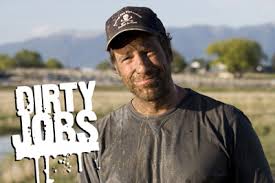
Mike Rowe, who hosted “Dirty Jobs” on The Discovery Channel until 2012, recently encountered a boy named Kenny who was having trouble understanding what’s real and what’s fake on TV reality shows. It started with questions about Discovery’s Shark Week, which included fictional movies about megalodon and submarine sharks, which don’t exist.
Rowe told Kenny that those were movies made to look like documentaries, but they used actors, not scientists. As Rowe writes on his Facebook page, that only made Kenny more inquisitive:
“So, what about the people on Dirty Jobs? Were they actors too?”
“No, Kenny. Those were not actors. Those were real people.”
“Really?”
“Absolutely,” I said. “We never used actors on Dirty Jobs, and we never made things up. That’s what made it special.”
Kenny considered.
“But…you’re an actor, right?”
“Me? No. Not really. I’m more like a host.” The father cleared his throat and leaned in to clarify.
“Kenny saw you on “Last Man Standing.” With Tim Allen. He thought you were very good.”
“Oh. Well…that’s different. Once in while I might take an acting gig. But “Last Man Standing” is a scripted show. Dirty Jobs is an unscripted show. The difference is really important.”
Kenny pondered.
“What about commercials? When you talk about Chevy trucks, are you acting or being real?”
“Actually Kenny, those were Ford Trucks. But to answer your question, I was being real.”
“What about those paper towel commercials. Are those people your real parents?
“Of course they are. But look, Kenny, commercials are very different from TV shows.”
“How?”
“Well, advertisers have to tell the truth. It’s the law. But the actors in the commercials don’t necessarily have to agree with or believe everything they’re told to say. That’s what acting is. You get paid to say someone else’s words in a convincing way.”
“So do you believe every single thing you say in a commercial?”
“Well, yes. As a matter of fact I do. But I didn’t always. When I was just getting started, I said all sorts of things on television that I didn’t really believe.”
Kenny contemplated.
“So, how can I tell the difference between people who are acting and people who are lying and people who are telling the truth?”
“That’s a good question, Kenny. Sometimes, it’s hard to know whom to believe.”
Rowe then went on to explain to Kenny how reality shows leave out a lot of stuff and only show you the things they want you to see, because reality can sometimes be boring, which doesn’t make good television.
At the very least, all of this has turned Kenny into a skeptic, not taking television at face value, and questioning whether what he’s seeing is real or fake. Good for you, Kenny!
Read Mike Rowe’s entire piece on his encounter with Kenny here.
